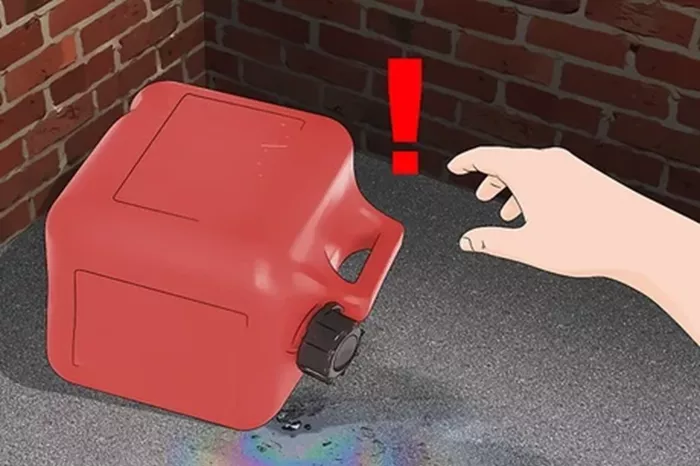Gasoline spills can happen unexpectedly and can pose serious risks to health and safety if not handled properly. Whether it’s a small spill while refueling a car or a larger incident involving a container, knowing how to respond calmly and effectively is essential. In this guide, we’ll explore step-by-step instructions on what to do if gasoline spills on you, as well as what actions to avoid to minimize risks and ensure personal safety.
Stay Calm: Managing the Initial Panic
Accidentally spilling gasoline can be frightening, but it’s crucial to remain calm. Panicking can exacerbate the situation and increase the risk of injury or further damage. Remember that you are capable of managing this problem effectively. Take a deep breath and focus on following the necessary steps to mitigate the spill and protect yourself and others.
Immediately Remove Gasoline-Stained Clothing
The first step after a gasoline spill is to remove any clothing that has come into contact with the gasoline. Prompt action is essential to prevent the gasoline from further soaking into the fabric and causing skin irritation or chemical burns. Carefully remove the contaminated clothing and place it in a sealed plastic bag to contain the odor and prevent the spread of gasoline.
Wash the Affected Area with Soap and Water
After removing gasoline-stained clothing (and any jewelry), it’s important to thoroughly wash the affected skin area with soap and water. The odor of gasoline and its potentially harmful components can linger on the skin, so proper cleaning is essential to remove any residue. Use mild soap and lukewarm water to gently cleanse the skin, paying close attention to areas that have been directly exposed to the gasoline.
Seek Medical Help If Any Symptoms Occur
Even with prompt washing, exposure to gasoline can lead to adverse health effects. If you experience symptoms such as headache, nausea, dizziness, or difficulty breathing after a gasoline spill, seek medical attention immediately. These symptoms may indicate inhalation of gasoline fumes or absorption through the skin, both of which require prompt medical evaluation and treatment.
Call Your Local Poison Control Center
If you’re uncertain about the effects of gasoline exposure or need additional guidance, don’t hesitate to contact your local poison control center. Trained professionals can provide advice on how to manage the situation and may recommend further medical evaluation if necessary. Keep the phone number of your local poison control center readily accessible for quick reference in case of emergencies.
See also: What To Do With Old Gasoline?
Actions to Avoid: Minimizing Risks
In addition to knowing what steps to take in response to a gasoline spill, it’s equally important to be aware of what actions to avoid. Certain behaviors can increase the risk of fire, injury, or environmental damage, so it’s essential to exercise caution and follow safety protocols.
Don’t Touch Anything
One of the most critical actions to avoid after a gasoline spill is touching anything in the vicinity. Gasoline is highly flammable, and even a small spark or source of ignition can lead to a fire or explosion. Avoid touching objects or surfaces that may pose a danger, including electrical outlets, light switches, and electronic devices. Keep a safe distance from the spill until it has been properly cleaned up and the area has been ventilated to dissipate fumes.
Don’t Attempt to Clean Up Large Spills Without Proper Equipment
While it’s important to address a gasoline spill promptly, attempting to clean up a large spill without the appropriate equipment can be hazardous. Gasoline spills can quickly spread and seep into the ground, posing environmental risks and increasing the likelihood of exposure to harmful fumes. If the spill is significant or involves a container rupture, contact emergency services or a professional hazardous materials cleanup crew for assistance. Attempting to manage a large spill without proper training and equipment can lead to personal injury and environmental damage.
Don’t Dispose of Gasoline Improperly
Proper disposal of gasoline is essential to prevent environmental contamination and ensure safety. Never pour gasoline down drains, sinks, or storm sewers, as this can contaminate water sources and pose risks to aquatic life. Instead, transfer gasoline to a suitable container designated for hazardous waste disposal and follow local regulations for proper disposal methods. Many municipalities offer hazardous waste collection programs or facilities where gasoline and other hazardous materials can be safely disposed of.
Don’t Smoke or Use Open Flames Near Spilled Gasoline
Smoking or using open flames near spilled gasoline is extremely dangerous and should be avoided at all costs. Gasoline vapors are highly flammable and can ignite with even a small spark, leading to fires or explosions. If you or someone nearby is smoking, extinguish all cigarettes or other smoking materials immediately and move to a safe location away from the spill. Likewise, avoid using lighters, matches, or any other ignition sources in the vicinity of spilled gasoline.
Conclusion
Handling a gasoline spill requires prompt action and careful attention to safety protocols. By staying calm, removing contaminated clothing, washing the affected area, seeking medical help if necessary, and contacting local authorities or poison control centers for guidance, you can effectively manage the situation and minimize risks to yourself and others. Avoiding actions such as touching anything, attempting to clean up large spills without proper equipment, improper disposal of gasoline, and smoking or using open flames near spilled gasoline is crucial for preventing accidents and ensuring personal safety. By following these guidelines, you can mitigate the effects of a gasoline spill and protect yourself, your loved ones, and the environment.
Related topics:
What Does Bad Gasoline Smell Like?

